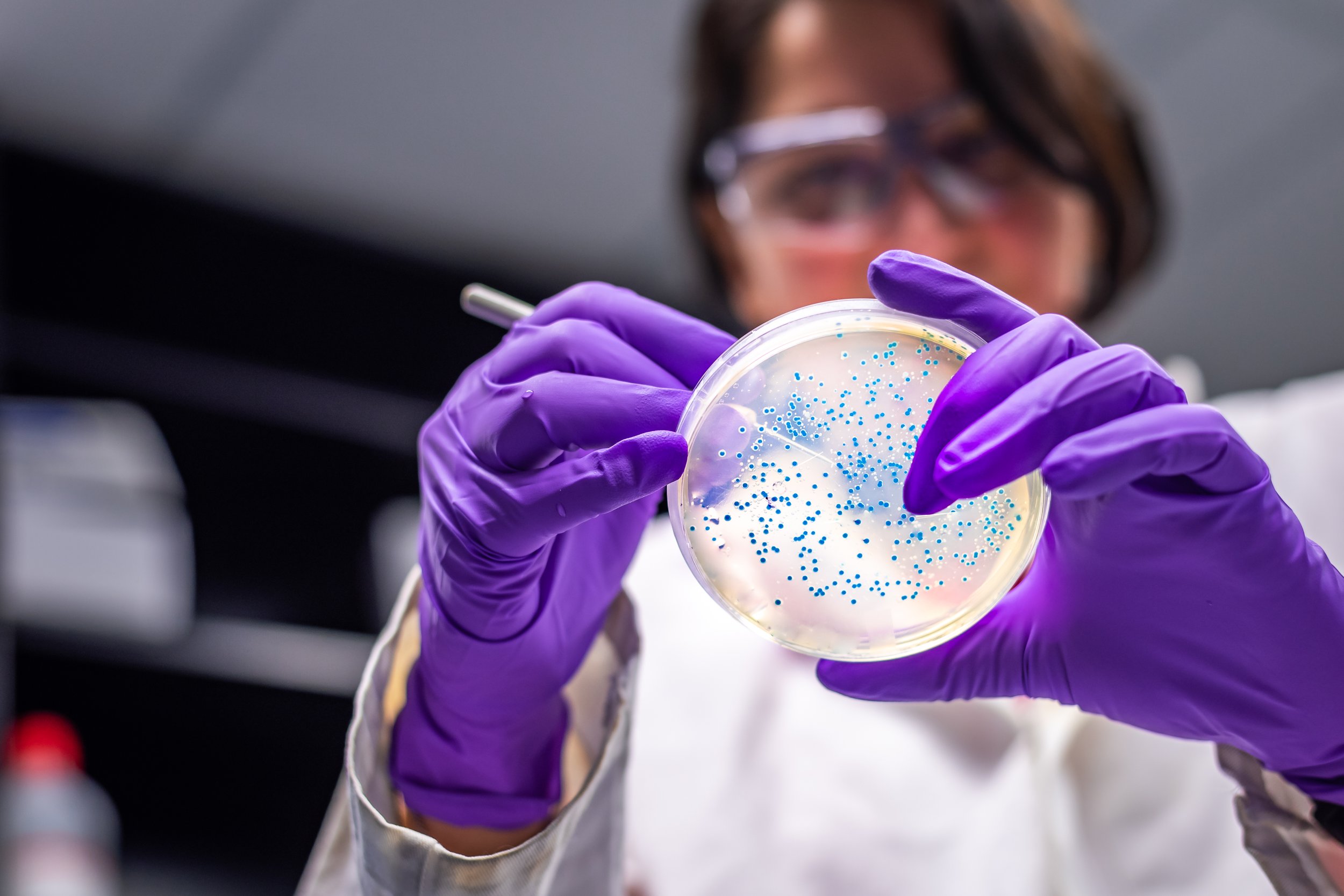Did you know that there are more bacteria in your stomach than there are stars in our solar system?
You might not know that World Gut Microbiome Day is celebrated each year on the 27th of June. But considering that there are around 100 trillion bacteria in your digestive tract, it’s hard not to step back and start respecting your gut as a very valuable ecosystem.
Recent studies have shown that our gut microbiome plays a critical role in our physical and mental health. And fastly-evolving research is providing experts with insights into the gut biome, many of which we can use to improve our health and wellbeing.
One such expert is Ken McGrath, the Clinical Solutions Manager for Microba Life Sciences, an Australian company leading scientific research on the gut microbiome.
Ken joined me on a recent episode of the Build Your Ideal Day podcast podcast to share his wisdom on the subject, including simple ways to take care of our gut.
In Ken’s case, his fascination with DNA science and microbiomes began living out on a farm, looking at the plants, animals, and even the soil, and having this inner knowledge that bacteria was everywhere - even if he couldn’t conceptualise it yet!
Ken’s upbringing brought an awareness of life and how even the plants around us have different genetics, properties, varieties, and DNA. Ken notes that plant roots have critical roles in ensuring plants thrive.
Ken turned his interest into a Molecular Biology Degree and later managed a DNA sequencing lab for ten years. Today, his team’s research is making waves, and I’m thrilled that he joined me to break down some of their findings.
Research into healthy gut biomes is still ongoing.
Firstly, it’s important to note that research into the gut microbiome is at a very early stage.
While new research is coming in thick and fast - Ken estimates that up to fifty new papers are coming in weekly! - we’re still only scratching the surface of how the microbiome influences human health.
So, while there have already been some fascinating discoveries about the gut, we’re far away from truly unravelling the mystery of the microbiome.
Still, we do know that the gut biome greatly impacts human health beyond just the gut.
One such finding is the discovery that the microbiome influences mental health. Research on mice showed that changing their gut biome affected their mood and behaviour. And large quantities of chemicals like serotonin, which also affect our mental health, are produced in the gut.
So while scientists aren’t clear on how it works yet, we do know that there’s a connection between the brain and the gut, which means our diet can contribute to better mental wellness.
The ongoing research - including cutting-edge technology used to generate microbiome reports - will only give us more comprehensive knowledge in the future.
Every gut is unique.
We all have a unique gut microbiome, so it’s important to remember that we should be reasonably cautious when adapting our diet.
For example, depending on where you were born, your gut might be Bacteroides-dominant (this usually includes people from Europe and North America) or Prevotella-dominant. These factors affect how we break down different fibres.
Similarly, people who grew up in an agricultural environment - like Ken - were exposed to different things than those who grew up in a hygienic bubble.
Those who grew up in a tribe in Africa are used to eating mostly plants. Eating the correct kinds of foods from early on gives good health outcomes compared to those of us who get by on processed foods, and their gut will also more easily break down plant fibres.
Comparatively, someone who eats primarily steaks puts their gut out of balance. The digestive system will need to spend excess time breaking down animal proteins and producing harmful compounds, so it’s essential to try and include plant fibres within your diet to balance that out.
Our environment shapes our gut biome, but even between twins, your microbiome is not quite like anyone else’s. Your microbiome is still unique, like a fingerprint.
Simple habits that lead to a healthier gut microbiome
The key to a healthier gut microbiome is diversity.
You don’t want to have one sort of bacteria overgrowing and overcrowding that space. You want many different species present for a really diverse gut.
And increasing microbiome diversity is important because it means your gut will be able to handle a more extensive range of functions. When your gut is home to many different species with different genes, then it can really handle the complexity of life and foods.
Whereas if your gut is too simple, with only a few species, then you’re going to miss out on some functions required to break down foods, which can lead to complications.
Here are a few ways people with busy lives can try and incorporate diversity into their diet:
1. Try to eat lots of different plants every week.
If you want a diverse microbiome, you have to eat diverse.
And the key to microbiome diversity is diverse plant foods.
To be clear, that doesn’t mean going vegan is a core requirement; Ken still enjoys an occasional steak but just makes sure he gets a diverse range of plant foods in as well.
2. Mix up the fruit and veggies you eat regularly.
So if you aim for five servings of veggies daily, try not to have an identical meal of carrot, peas, broccoli and potato for every dinner. That’s not good for your gut, as it doesn’t promote diversity.
3. Aim for 40 different plant foods per week if you want a specific target.
Yes, that might seem like a lot, but Ken aims for 40 different plants in his diet every week. Ken points out that it might seem like a huge number, but it’s just 7 or 8 servings daily.
A few easy ways to get extra plants into your diet each day include:
● sprinkling sesame seeds onto your salad
● adding additional ingredients to your cereal or granola
● eating curries with lots of spices and ingredients
● tick a load of plants off in one go with a varied chopped salad at lunch.
Instead of plain oatmeal, you could top it with extra seeds, fruit, and nuts, or make an oatmeal alternative packed with oats, barley, and sorghum.
And it goes without saying that adding some healthy chia seeds and chopped apricots to your breakfast will nourish you and keep you full for longer.
Many ways to add plants to your meal are reasonably achievable, especially once you start adding them out of habit.
4. Include prebiotics in your diet.
Include prebiotics in your diet - in simple terms; they are a great energy source for the good bugs in your gut. Prebiotics include legumes, asparagus, berries, onions, and garlic.
Resistant starch is another brilliant prebiotic. As our body resists digesting it, the resistant starch feeds our gut. Green banana flour (commonly found in Australia) and plantain flour are two fantastic naturally occurring sources of resistant starch. You’ll also find it in cooked and cooled rice, potatoes or pasta.
5. Don’t forget about probiotics.
And try to include probiotics, too, such as yogurts, kombucha, sauerkraut, tempeh, kimchi, and sourdough bread.
Of course, not all of these food types are born equal, so check labels and brands if you want to double-check that they’re truly a good source of pre or probiotics.
6. Don’t over-rely on supplements.
Only use supplements as a backup, not as the primary way to get nutrition. If possible, eat prebiotics in their whole food form - not the powdered version.
Whole foods have more nutritional value than supplements, so you should only rely on the latter should only when you’re too busy. Otherwise, your gut will miss out on some benefits.
Of course, when you’re too busy to get all your nutrients in, Ken adds that sprinkling healthy supplements in a drink or on top of breakfasts can be a good approach too.
7. Take things slow when introducing new ingredients to your diet.
Don’t go overboard when adding new food types to your diet. Give your body a chance to catch up with your new diet.
Ken adds that it’s normal to have bloating and gas when you switch things up; your body isn’t used to digesting it and can get upset initially.
When adding new things to your diet, like probiotics, begin with a third of the recommended dose or portion. And if you already know you have trouble with digestion, speak to your doctor before changing what you eat.
8. Put your gut to the test.
If you want to find out more, companies like Microba also offer tests where you can learn about the diversity of your unique gut.
Following your test, you can determine whether your gut’s more likely to produce more good or bad compounds. Then, you’ll be able to use tailored results on switching up your diet to influence the health of your microbiome.
If you take the test and find the reports too overwhelming, you can always speak to one of Microba’s nutritionists or dieticians. They can run through your results with you and tell you exactly what to do with that information.
Can you trust your gut to keep you healthy?
‘Gut health’ has become a bit of a buzzword of late, with plenty of supplements and diet hacks professing to give you a healthy gut.
Unfortunately, as my recent guest Ken McGrath pointed out, there’s a lot of misinformation around these claims.
While a vast amount of research supports the importance of a healthy gut microbiome, you can’t easily Google the subject and find accurate guidance; it’s important to find legitimate sources regarding your gut health.
Reliable sources of the gut health information we recommend are:
Felice Jacka, from the Food & Mood Centre in Melbourne, joined me on a previous episode of the Ideal Day podcast to discuss the impact of what we eat on our overall health.
Felice also has a brilliant children’s book, ‘There’s a Zoo in my poo,’ which introduces the idea of different microbes being really important for our health, but in an enjoyable way.
Ken also recommends the Gut Microbiota for Health group on Twitter; they are pretty good at updating their feed with the latest research. They’ll read new papers and distil them into a digestible message to make them easier to understand.
Universities doing food and nutrition research also share a wealth of helpful content, including Microba. Their website contains resources and educational content, such as blogs and webinars, where you can learn more about gut health.
Today’s key message: how to keep your gut microbiome healthy
Try eating 40 different plants a week as your target. When you order or cook lunch and dinner, take a moment to consider if there are any extra plants you can add to it.
It’s all about diversity! Try not to eat the same veggies every night - switch things up.
If you want to understand your gut and be sure you’re on the right path, speak to local professionals or practitioners about taking a test.

